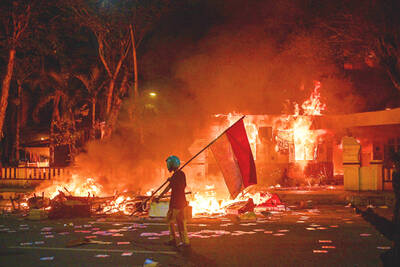In violence-wracked Nepal, where government forces have failed to defeat a nine-year Maoist insurgency, members of a small communist party have launched a nonviolent attempt to erode support for the rebels despite fears of attacks.
The People's Front Nepal split from the rebels 14 years ago, criticizing the guerrillas' violent campaign to topple Nepal's monarchy as extreme and against communist principles.
The group's members have recently fanned out into the rebels' strongholds in the countryside to paste up posters, distribute pamphlets and organize meetings to draw attention to abuses committed by the rebels and encourage people to peacefully defy them.
"They call themselves Maoists, but they have deviated from the visions of communism. They have become more of an ultra leftist force," said Pari Thapa, a senior party leader.
The rebels have been accused of attacking and even killing people who oppose them, as well as forcibly conscripting villagers and extorting money from them, calling it a tax for the "people's government."
The front, Nepal's fifth-largest political party, is the only group that has dared to venture into rebel territory to campaign against them, despite fears of being detained and beaten.
"It may not sound like much ... but we want to bring to light what they really are," Thapa said. "They frequently tell their cadres that they are winning the war and they will be in full control of the country soon. It is the only way to motivate their fighters who have faced some major setbacks recently."
The Maoists, claiming to be inspired by Chinese revolutionary Mao Zedong (
Thapa said that his party believes in nonviolence and democracy -- it supports Nepal's constitutional monarchy, in which the king is a figurehead and an elected government is supposed to rule the country.
"We want to expose to as many people as we can all the wrong things which are going on within the Maoist group. Our campaign is a peaceful one," he said.
The campaign suffered a setback, however, when King Gyanendra seized absolute power in February and imposed emergency law. Three leaders of the People's Front were among hundreds of politicians arrested. Most were freed after Gyanendra lifted the emergency three months later, but some remain in jail.
Thapa hopes the People's Front can reach a much larger population in the country's rural interior, where the rebels have a strong presence. Hundreds of front members and supporters have been detained and beaten, and half a dozen have been killed by Maoist rebels in the past two years, Thapa said.
Even an attack on Thapa's wife in their rural home has not deterred them from their aim.
"We don't want to finish off the Maoists. We want to see them correct their mistakes. After all they also are our Nepalese brothers and sisters," Thapa said.
"Their violent movement will lead nowhere ... it will be futile," he said.

Australia has announced an agreement with the tiny Pacific nation Nauru enabling it to send hundreds of immigrants to the barren island. The deal affects more than 220 immigrants in Australia, including some convicted of serious crimes. Australian Minister of Home Affairs Tony Burke signed the memorandum of understanding on a visit to Nauru, the government said in a statement on Friday. “It contains undertakings for the proper treatment and long-term residence of people who have no legal right to stay in Australia, to be received in Nauru,” it said. “Australia will provide funding to underpin this arrangement and support Nauru’s long-term economic

‘NEO-NAZIS’: A minister described the rally as ‘spreading hate’ and ‘dividing our communities,’ adding that it had been organized and promoted by far-right groups Thousands of Australians joined anti-immigration rallies across the country yesterday that the center-left government condemned, saying they sought to spread hate and were linked to neo-Nazis. “March for Australia” rallies against immigration were held in Sydney, and other state capitals and regional centers, according to the group’s Web site. “Mass migration has torn at the bonds that held our communities together,” the Web site said. The group posted on X on Saturday that the rallies aimed to do “what the mainstream politicians never have the courage to do: demand an end to mass immigration.” The group also said it was concerned about culture,

ANGER: Unrest worsened after a taxi driver was killed by a police vehicle on Thursday, as protesters set alight government buildings across the nation Protests worsened overnight across major cities of Indonesia, far beyond the capital, Jakarta, as demonstrators defied Indonesian President Prabowo Subianto’s call for calm. The most serious unrest was seen in the eastern city of Makassar, while protests also unfolded in Bandung, Surabaya, Solo and Yogyakarta. By yesterday morning, crowds had dispersed in Jakarta. Troops patrolled the streets with tactical vehicles and helped civilians clear trash, although smoke was still rising in various protest sites. Three people died and five were injured in Makassar when protesters set fire to the regional parliament building during a plenary session on Friday evening, according to

CRACKDOWN: The Indonesian president vowed to clamp down on ‘treason and terrorism,’ while acceding to some protest demands to revoke lawmaker benefits Protests in Indonesia over rising living costs and inequality intensified overnight, prompting Indonesian President Prabowo Subianto to cancel a planned trip to China, while demonstrators reportedly targeted the homes of the finance minister and several lawmakers. Rioters entered Indonesian Minister of Finance Sri Mulyani Indrawati’s residence near Jakarta early yesterday, but were repelled by armed forces personnel, Kompas reported. Items were taken from the homes of lawmaker Ahmad Sahroni and two others, according to Detik.com. The reports of looting could not be independently verified, and the finance ministry has not responded to requests for comment. The protests were sparked by outrage over